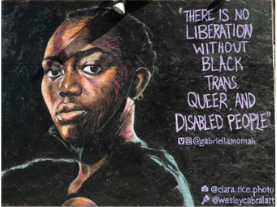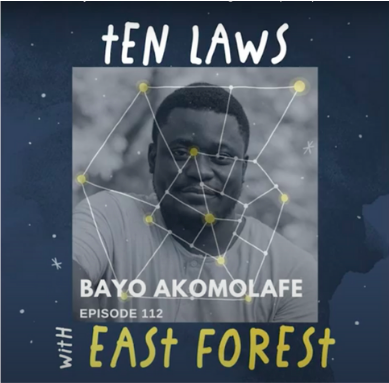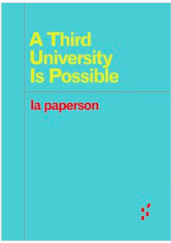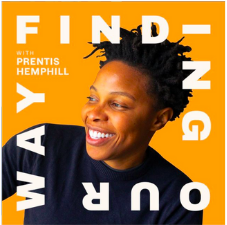Dear Members of the Emerson Community,
Consistent with a longstanding tradition, the SJC Community Update typically begins with message from me. In those messages, I often share a reflection about what’s happening at Emerson or in the world. Sometimes I scribe a short message intended to speak to the heart. This update is no different, except that this will be my last message to the Emerson Community
as Vice President for Equity & Social Justice.
“All that you touch
You change.
All that you Change
Changes you.
The only lasting truth
Is change.”
– Octavia E. Butler
My friends, it has been a wild ride—full of incredible moments, deeply moving experiences, and the most wondrous and unexpected opportunities for personal growth. I must say that so many of my most treasured memories at Emerson have happened in community with students—with the activists and advocates, agitators and accomplices, the co-conspirators and the curious—all of you who have cared enough about Emerson to call on it to live up to its highest promises. Please know that you gave me life. There have been so many times when I was in awe of your fearlessness, your ability to speak truth to power, and your deep commitment to moving in solidarity with one another. You all know who you are. Please know that while I am leaving my role at Emerson, I am not leaving you. I am so honored to have crossed paths with you and we will find each other. Look me up on social.
In the past nine years, there have also been moments that were unbelievably challenging. Of course, some challenges are to be expected with my position, a role that by its very nature disrupts the status quo and disquiets the comfortable. There have been times when I have witnessed and experienced harm, times when people have disappointed me, and times when circumstances revealed things about us as a community that I wish I had not known. All of this, the good and the not so good, comes with being in a community struggling together to become its better self.
While I will not be around to see all of the change that we wanted to see come to pass at Emerson, I know that there are so many kindreds among this community of students, faculty, and staff who will carry this good and important work forward. I thank you for your labor toward making Emerson a place where people—Black, Brown, Queer, Trans, Disabled, First Gen, people without government papers, the religiously diverse, and those struggling financially—can show up fully in all of their beauty in a beloved community of care. We should never settle for anything less.
To the staff of the SJC, past and present, “What’s up, Family!” I thank you for your fierce commitment to justice, your quirky and raucous humor, the fantastic home-cooked meals we have shared, and your willingness to trust in me. There just might be a few “self-actualized jewels,” among you, after all.
Finally, one of the things I have learned during my time at Emerson is how important it is to control the narrative. My departure from Emerson will be framed in a number of ways, some of it will be accurate and some of it will not.
So, if you hear someone say that I left because I wanted to work closer to home, or I left because President Pelton left, or I left because of campus activism, please know that none of those things would ever be enough of a reason.
During the pandemic, I found myself frequently summoned by an internal question—“What am I called to do with the precious life force energy that I have been given?” Over many months, I discovered that I am called to find the cure for what ails higher education. That’s why I came into higher education in the first place. So, my leaving is actually a continuation of a quest that was started many years ago.
Today, I can’t think of a better use of my life force energy than working to develop an educational model that honors and serves the students who are the most marginalized but who have so very much to offer the world.
In Solidarity,
Sylvia
Best Wishes for Greta
It is with mixed emotions that I share that Greta Spoering, Associate Director of the Healing & Advocacy Collective, and Survivor Counselor/Advocate, will be leaving Emerson for another opportunity across the river at Harvard as the SHARE Senior Clinical Coordinator within the Office for Gender Equity where she will continue to do prevention and response work, while taking on the task of opening a new space to support those who have been impacted by power-based interpersonal violence on Harvard’s campus. Greta’s last day will be July 23. As many of you know, Greta’s contributions over the past seven years have been far reaching and deeply impactful for so many Emersonians. Greta has been a source of solace and support for those impacted by power-based violence and other harms, a fierce advocate for trauma-informed practices, and a caring and compassionate space holder for so many individuals and groups. She has also been an expert educator and facilitator who has developed enduring relationships across the campus. Not only has Greta increased consciousness about the personal and systemic impact of oppression on people and communities, but she has made significant contributions to shifting the culture at Emerson.
Greta has also been a vital member of the Social Justice Center staff. She helped to shape much of what the Social Justice Center has become in so many ways. She contributed to the development of the Bias Response program, now the Identity-Based Harm program, when students had nowhere to bring their concerns. She was also a significant contributor to Mapping the Margins of RePresentation: A Response to Students’ Call, also known as the “black book,” published by the Social Justice Center in 2019. She was a key player in the development of the SJC LIVE Facebook Series, the many SJC poster campaigns that we have launched, the person behind our thought-provoking social media posts, and so many other programs and events.
Greta has been an extraordinary teacher and guide to all of us in the SJC, nudging us to deepen our social justice practice by sharing yet another book for us to read or suggesting another podcast of note. But, most importantly, Greta has modeled for us every day what it truly means to show up for people. The Social Justice Center and Emerson is better place because Greta has been part of this community.
I am forever grateful for Greta’s friendship, wise counsel, and her magical ability to turn into a powerful super human, whenever the situation warrants it. I wish Greta the very best as she continues to embody what it means to live justice in every breath.
Healing & Advocacy Growth and Transitions
Building on the incredible work that Melanie and Greta have done building a place of support for people who have been impacted by power-based interpersonal violence, the Healing & Advocacy Collective will be growing to address community need. In response to the ESOCWeekOfAction Student Demands, Healing & Advocacy received approval for an additional employee position. The search has begun for staff to join Healing & Advocacy to assist with advocacy-based counseling and prevention. In addition, graduate interns will be joining Healing & Advocacy in September. Additional staff will strengthen and enhance our continued support of community, especially for Black, Indigenous, People of Color, Trans and Genderqueer folks, and community members with disabilities.
www.penguinrandomhouse.com/books/622408/we-want-to-do-more-than-survive-by-bettina-love
Drawing on her life’s work of teaching and researching in urban schools, Bettina Love persuasively argues that educators must teach students about racial violence, oppression, and how to make sustainable change in their communities through radical civic initiatives and movements. She argues that the US educational system is maintained by and profits from the suffering of children of color. Instead of trying to repair a flawed system, educational reformers offer survival tactics in the forms of test-taking skills, acronyms, grit labs, and character education, which Love calls the educational survival complex.
https://www.dukeupress.edu/the-right-to-maim
In The Right to Maim Jasbir K. Puar brings her pathbreaking work on the liberal state, sexuality, and biopolitics to bear on our understanding of disability. Drawing on a stunning array of theoretical and methodological frameworks, Puar uses the concept of “debility”—bodily injury and social exclusion brought on by economic and political factors—to disrupt the category of disability.
In this episode, Prentis sits with activist, organizer, educator, and author, Mariame Kaba, to discuss abolition and its connection to healing work. This conversation asks us to confront difficult truths about our enacting of relationship, our striving for innocence, and how much we might actually draw pleasure from punishment.
[Image Description: A wider horizontal bar of blue with white text, “617-824-8528. sjc@emerson.edu. Facebook/SocialJusticeCtr. www.emerson.edu/social-justice-center.”]
Social Justice Center


 A Letter from Sylvia Spears on Juneteenth
A Letter from Sylvia Spears on Juneteenth
 Ten Laws Podcast with East Forest, #112 with Bayo Akomolafe: Uncovering Bones
Ten Laws Podcast with East Forest, #112 with Bayo Akomolafe: Uncovering Bones
 Finding Our Way Podcast, Season 2
Finding Our Way Podcast, Season 2